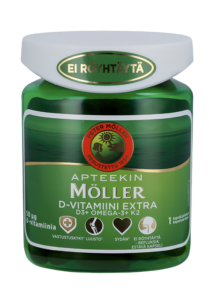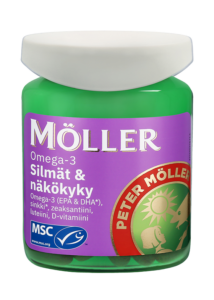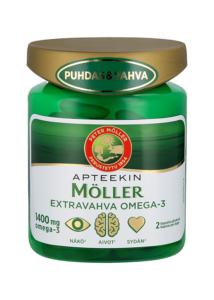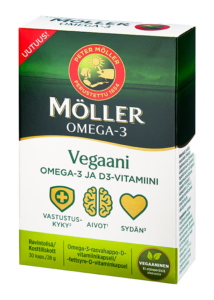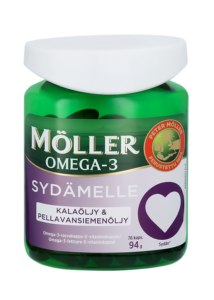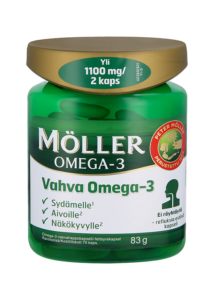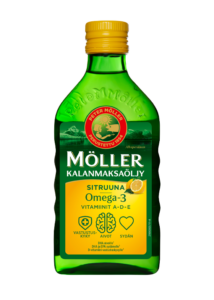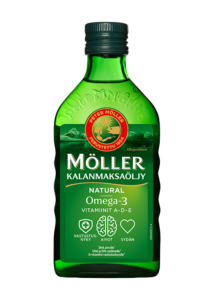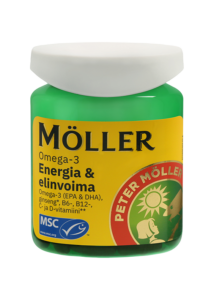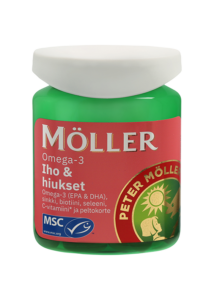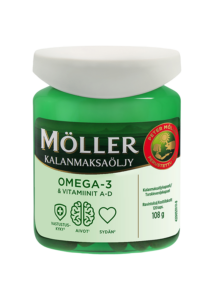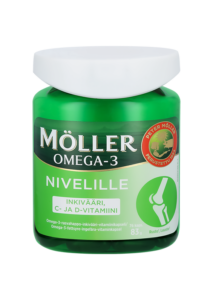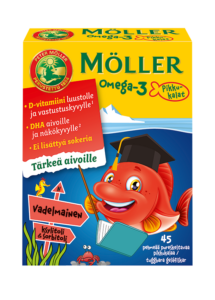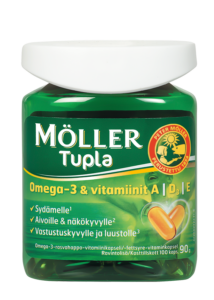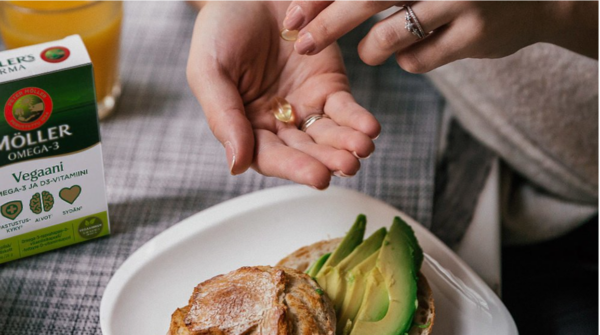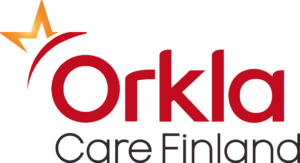You’ve heard of DHA and you probably know it’s an essential fatty acid. But why is this omega-3 fatty acid considered essential?
Home » DHA – An essential omega-3 fatty acid
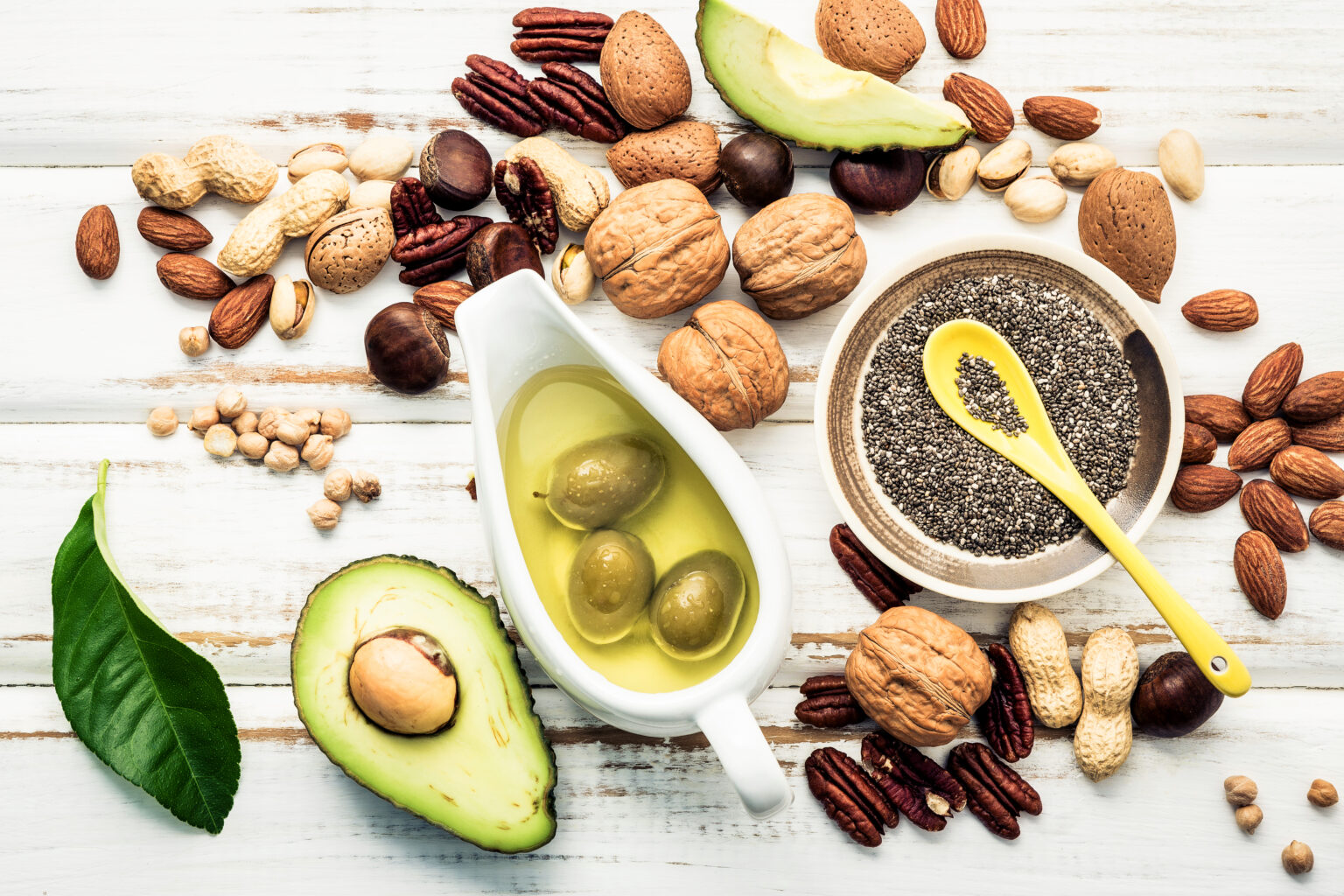
Read more articles about omega-3
Docosahexaenoic acid (DHA) is one of the long-chain omega-3 fatty acids that has proven health benefits for the body. It is essential for maintaining normal heart and eye function, and is found in the brain, skin and eyes. It is also proven to contribute to normal heart function.
DHA can be produced in the body from the short-chain omega-3 fatty acid ALA (which we ingest through a variety of plant foods such as flax seeds, chia seeds and walnuts) but the conversion rate is low, often less than 1%. The way to increase the amount of DHA in your body is by eating fatty fish or taking a cod liver oil supplement. As DHA occurs naturally in fish and algae, these are considered the best sources of this long-chain omega-3 fatty acid.
Sources of DHA
The primary sources of the marine omega-3 fatty acids EPA and DHA are microalgae (i.e. phytoplankton). Herbivore fish eat these organisms and store omega-3 fatty acids such as EPA and DHA in their adipose tissue.
The concentration of DHA and EPA differs in the various fish species and can change between seasons. Therefore, you need to be aware of the difference between oily and lean fish. Examples of lean fish are cod, plaice and haddock. Although cod is considered a lean fish, its liver contains a considerable amount of omega-3 fatty acids. Examples of oily fish are mackerel, anchovy, salmon and herring and they all contain about the same amounts of omega-3. The amount of omega-3 in the edible parts (fillets) of oily fish is higher than in lean fish.
DHA for brain and eye health
An important component of the body’s cell membranes, DHA is particularly prominent in the membranes of brain cells and the retina. DHA constitutes 90% of omega-3 fatty acids present in the brain and up to 25% of the brain’s total fat content.
DHA is mainly found in the brain’s grey matter. These parts of the brain are responsible for processing information, memories and emotions, and they are also important for social, emotional and behavioural development.
Maintaining normal brain and eye function is an important benefit of DHA. These beneficial effects are achieved by ingesting 250 mg of DHA per day.
The optimal amount of omega-3
It is generally recommended that 1% of the energy from food comes from omega-3 fatty acids. With an average daily intake of 2,200 kcal, this corresponds to approximately 2 grams of omega-3, including ALA and the other omega-3 fatty acids.
A daily intake of 250mg of DHA and EPA is recommended to maintain normal heart, brain and eye function. A spoonful (5 ml) of cod liver oil provides 1.2 g of omega-3 fatty acids, of which 1 g consists of EPA plus DHA, in addition to the NHS recommended intake of 10µg per day of vitamin D.
Children and DHA
DHA is important during childhood because the brain continues to develop up until adulthood. A daily intake of 250mg of DHA helps to maintain normal brain function.
Not all children eat 2-3 servings of oily fish per week and cod liver oil is a good alternative source of DHA, EPA, in addition to vitamin D.
Pregnancy and DHA
During pregnancy and breastfeeding, an intake of DHA is particularly important for both mother and baby. This is because the mother’s intake of DHA (200 mg per day), contributes to the normal development of the brain and eyes of the foetus and breastfeeding baby.
The body requires rapid and effective accumulation of specific fatty acids during pregnancy. These fatty acids include AA (arachidonic acid) and DHA in the infant brain, DHA in the eyes and AA in all the cells of the body.
To obtain the beneficial effects of DHA, a pregnant or breastfeeding mother should have a daily intake of 200 mg of DHA, in addition to the daily intake of 250 mg of DHA and EPA for
What is good health?
Do you have a good lifestyle?
Lifestyle simply means the way in which you live. Health and lifestyle go hand in hand. You might feel you have a good lifestyle if you are physically active, eat healthily and generally experience a sense of wellbeing. Conversely, if you want good health you should also have a good lifestyle.
Physical activity is the major contributor to a good lifestyle, but diet, drugs, stress, sleep and social conditions are also play an important role. Being able to use the body properly to avoid injury also affects lifestyle. Physical activity can also prevent depression and help you to recover more quickly from mental illness, both of which obviously affect your lifestyle.
Diet can be a difficult topic for many. Perhaps you eat too much or too little or maybe you find it hard to know what foods to combine to have a balanced diet. It’s also important to eat food that contains important vitamins, minerals and dietary fibre, omega-3 and antioxidants. On top of all this, you also need to get enough energy, protein and the correct fatty acids. The requirement for these nutrients changes throughout your life. When you are older you also have different requirements than children and younger adults. Women also have different requirements than men. Pregnant and breastfeeding mothers also have special requirements.
When you get older, you lose muscle mass and your body requires less energy and therefore less food. You may lead a less active life than you did before, which is why you require less food. However, your need for minerals, vitamins and other nutrients remains the same. Of course, there are plenty of healthy and active older people, but when you reach 70 to 80 years of age, it’s easier to become ill, especially during flu season.
Some steps you can take to improve your lifestyle and health are to:
- eat a healthy and varied diet
- stay active
- watch your weight
- avoid too much alcohol and don’t smoke
- get enough sleep
- think positive
- practise good hygiene
What is good quality of life?
The World Health Organisation (WHO) defines quality of life as a state where the individual can realise their potential, cope with normal stressful situations, work in a rewarding and positive way, and be able to contribute to others and society.
Quality of life is a wide and somewhat diffuse concept that includes joy in, and a desire for, life. These are values that are rather felt than measured, which in turn are based on personal environment and choices. Quality of life doesn’t necessarily depend on being healthy or sick. It’s the moments between worries, sorrows, problems and ailments that matter. For example, if you have a chronic illness, a feeling of mastery can be important when talking about quality of life.
To sum up, quality of life is a combination of health, lifestyle, networks and social support. It’s about experiencing joy, meaning in life, satisfaction, security and a sense of belonging, as well as being able to use your strengths. It’s also about feeling interest in life, coping with everyday situations and a being committed to something or someone. If you have good quality of life, you will be able to cope better with the inevitable stressful situations in life.
Tuotteita
-
Apteekin Möller D-Vitamiini Extra
Möller omega-3 valmiste lihaksille ja nivelille. Sisältää omega-3 rasvahappoja, magnesiumia, mangaania, C- ja D-vitamiineja sekä inkivääriä.
-
Möller Omega-3 Silmät & näkökyky
Möller omega-3 valmiste lihaksille ja nivelille. Sisältää omega-3 rasvahappoja, magnesiumia, mangaania, C- ja D-vitamiineja sekä inkivääriä.
-
Möller Omega-3 Lihakset & nivelet
Möller omega-3 valmiste lihaksille ja nivelille. Sisältää omega-3 rasvahappoja, magnesiumia, mangaania, C- ja D-vitamiineja sekä inkivääriä.
-
Möller Vegaani Omega-3 ja D-vitamiini
-
Möller Sydämelle
-
Möller Vahva Omega-3
-
Möller Kalanmaksaöljy Sitruuna
-
Möller Kalanmaksaöljy
-
Apteekin Möller Extravahva
-
Möller Omega-3 Energia & Elinvoima
-
Möller Omega-3 Iho & hiukset
-
Möller Omega-3 Kalanmaksaöljykapseli
-
Möller Nivelille
-
Möller Omega-3 Pikkukalat
-
Möller Tupla

